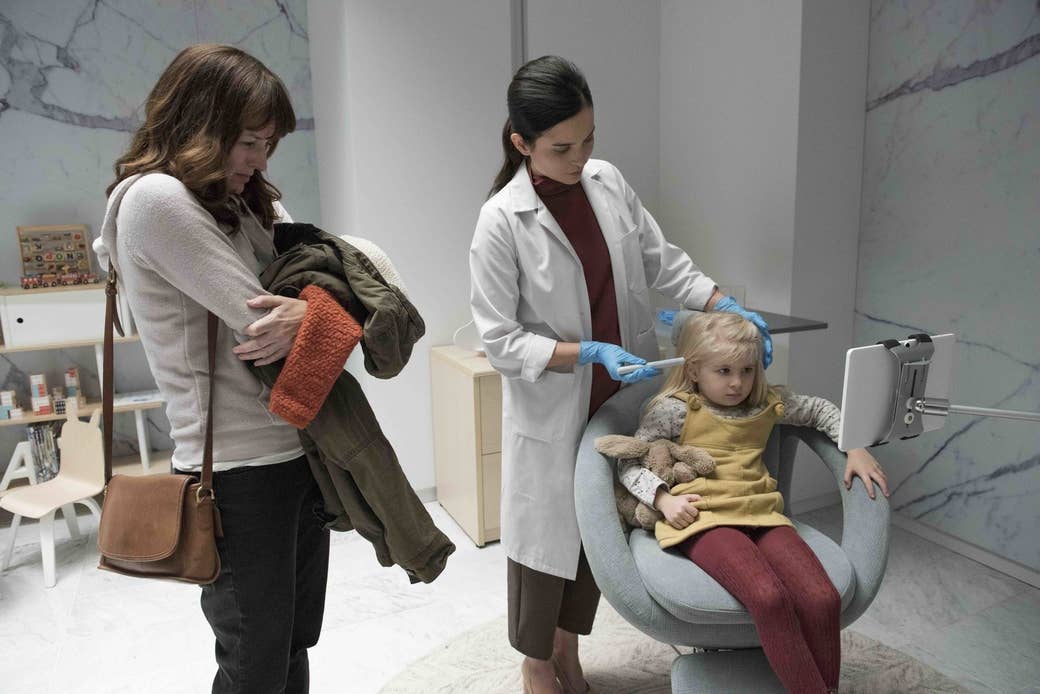
When Jodie Foster had lunch with Cindy Holland, Netflix's vice president of original content, Foster recalls she was "bemoaning the film industry, as usual, while eating sushi." Foster told Holland that though she enjoys serialized television, what she likes more is directing short stories with "a beginning, a middle, and an end." In other words, movies. But movies aren't necessarily easy to make these days, especially the thoughtful dramas Foster likes to direct. When the Netflix executive heard Foster's complaints, "she said, 'I've got the show for you,'" Foster told BuzzFeed News.
The show Holland wanted Foster to consider was Black Mirror, the science fiction–drama hybrid created by Charlie Brooker, who writes most of the show's episodes. And though Foster had worked with Netflix before — directing two episodes of Orange Is the New Black and one of House of Cards — she hadn't watched Black Mirror. But she quickly remedied that.
Foster, 55, has been working in the entertainment industry since she starred in a Coppertone commercial when she was 3 years old. She has acted in dozens of movies, and won the Best Actress Oscar twice, once for The Accused in 1988 and again for 1991's Silence of the Lambs. She has also directed four feature films and — now including Black Mirror — four episodes of television.
Though all Black Mirror episodes draw their plots from ethical dilemmas precipitated by technology, each one has a completely different story and cast — and some are more high-concept (and ornate) than others. As a result, Black Mirror, now in its fourth season on Netflix (all six episodes went up on Friday) offers varied pleasures to its fans, who can often cite their favorite episodes by name. Some favor the realistic nihilism of Season 1's "The National Anthem," in which a British prime minister is blackmailed into fucking a pig on television; others love the empty-feeling yearning of "Be Right Back" from Season 2, in which a woman whose boyfriend dies in an accident has to weigh whether she wants him to live on with her through artificial intelligence; and many adore the optimistic, romantic "San Junipero" from Season 3, in which two women fall in love in a virtual reality space, and have to decide whether to spend eternity together.
Which brings us to Foster's "Arkangel," written by Brooker. It's the story of a mother named Marie (Rosemarie DeWitt) and her daughter, Sara (played by three actors at different ages, but most weightily by Brenna Harding) — and, of course, some ill-used technology. Foster called "Arkangel" "a small indie movie," particularly in contrast to more glossy, futuristic episodes of Black Mirror.
When I interviewed her in 2016 before the release of Money Monster, Foster said she enjoys directing television because she likes "serving a creator," and, with an established show, "serving that template." But with Black Mirror, there is no template, and Brooker and executive producer Annabel Jones let the directors forge their own paths. "They have each show be its own entity," Foster said with appreciation. She hired nearly an entirely new crew, from the director of photography to the composer, and though Jones was the on the set, Foster didn't meet Brooker until editing began. "They really respect the process of filmmaking and really respect the director's vision, and they don't try to interfere even though they have very important points to make and they're incredibly helpful," Foster said. "The way producers used to be!"
Foster talked to BuzzFeed News about "Arkangel," sharing how she cast the episode, what it says about motherhood, the dilemmas of the Arkangel technology, and that ending. There are spoilers both large and small below, so do stop reading now if you haven't seen the episode.
1. Brooker and Jones gave Foster the freedom to cast "Arkangel" as she saw fit.
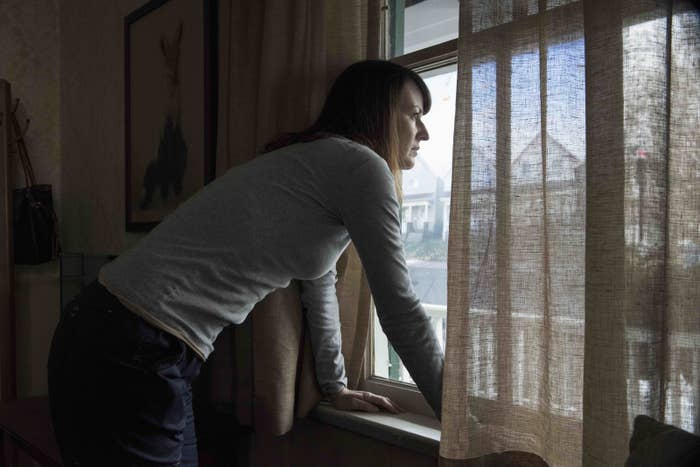
For the part of Marie, she cast DeWitt, who is a close friend. "And I've never done that before," Foster said. "I remember saying to my friends, 'I really think Rosemarie is the right person for it, but I feel weird saying anything!' Because we really are very good friends."
"Rosemarie has a quality that is so hard to find in Hollywood," she continued. "This almost stolen improvisational quality. She's such an amazing listener; she's exactly what I was looking for, that style of acting."
Then there was casting teenage Sara, the other crucial "Arkangel" role. Harding, who is 21, has worked steadily in her native Australia from the time she was a teenager. "We looked at a lot of tapes of a lot of people," Foster said, "and I thought she was awesome." The role of teen Sara demands she display a "burgeoning sexuality," Foster said, and Harding brings "this combination of being both so wide-eyed and so powerful, even without understanding what her power is."
"What I really love about her, what I love about both of them, Rosemarie and Brenna together, is you really believe these are people in some town that you met," Foster said.
2. Black Mirror episodes are often set in opulent surroundings, but Foster didn't want that.
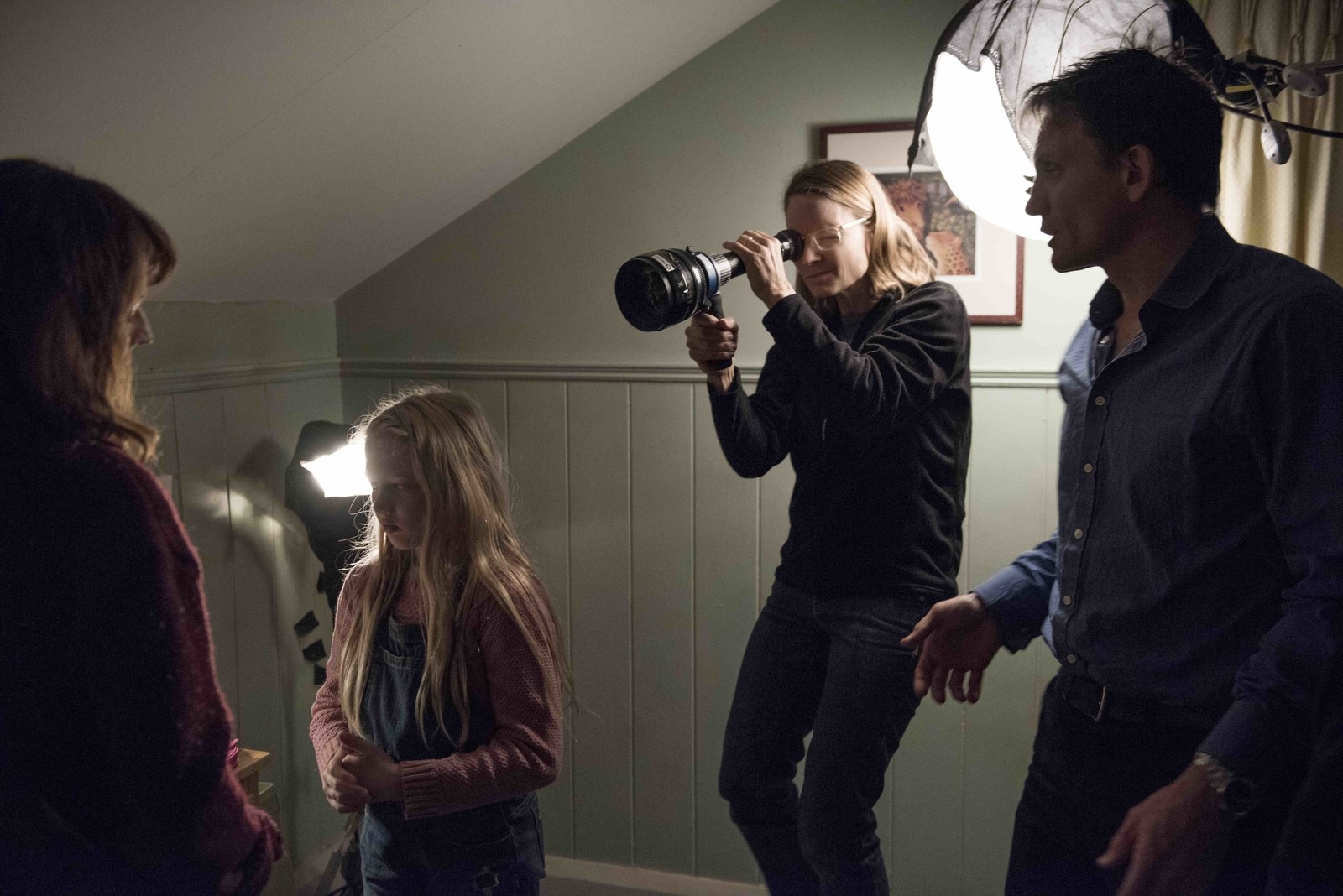
"Arkangel" was filmed in and around Toronto in November 2016, during an almost four-week shoot, with the Canadian city standing in for a blue-collar American one. Marie is a single mother, and a physical therapist, living in a working-class neighborhood, which Foster said was "not in the original script." But that's how she imagined America's near future, instead of one in which everyone rides around on "magic carpets."
"I felt it was a hardscrabble place that had been damaged in some ways — there's a feeling of damage and abandonment and things that have been swept under the rug," Foster said. "These were people who were struggling, and that's a part of the DNA of their world."
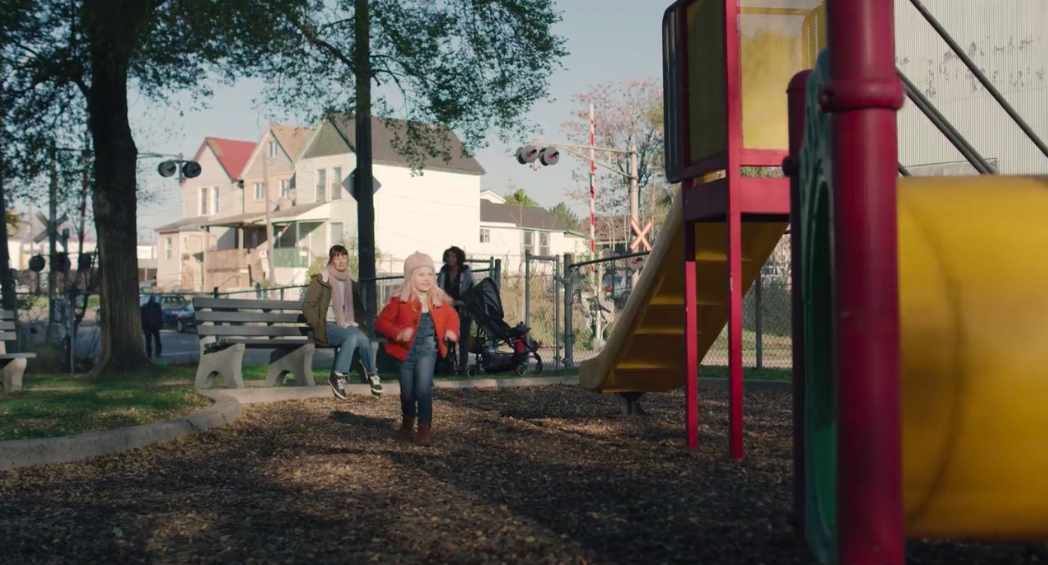
After she almost loses Sara (played by Aniya Hodge) in a park when she's 3 years old, Marie — already a nervous parent — goes to a tech startup called Arkangel. There, Sara gets a chip put in her brain (never a good thing in Black Mirror!) that will track her whereabouts on an iPad-like screen, as well as monitor her body functions, allow Marie to see through Sara's eyes on the screen, and control any disturbing imagery Sara might come across. At first, Marie bristles at the idea of the parental controls, which blur out troublesome imagery. "It's all optional," the Arkangel technician assures her.
Yet despite her reservations, it doesn't take much for Marie to turn on the censoring software — just a barking dog who lives next door, who scares Sara: "She gets sucked into it," Foster said.
3. Sara begins to live a life in which everything that could potentially upset her is a literal blur.
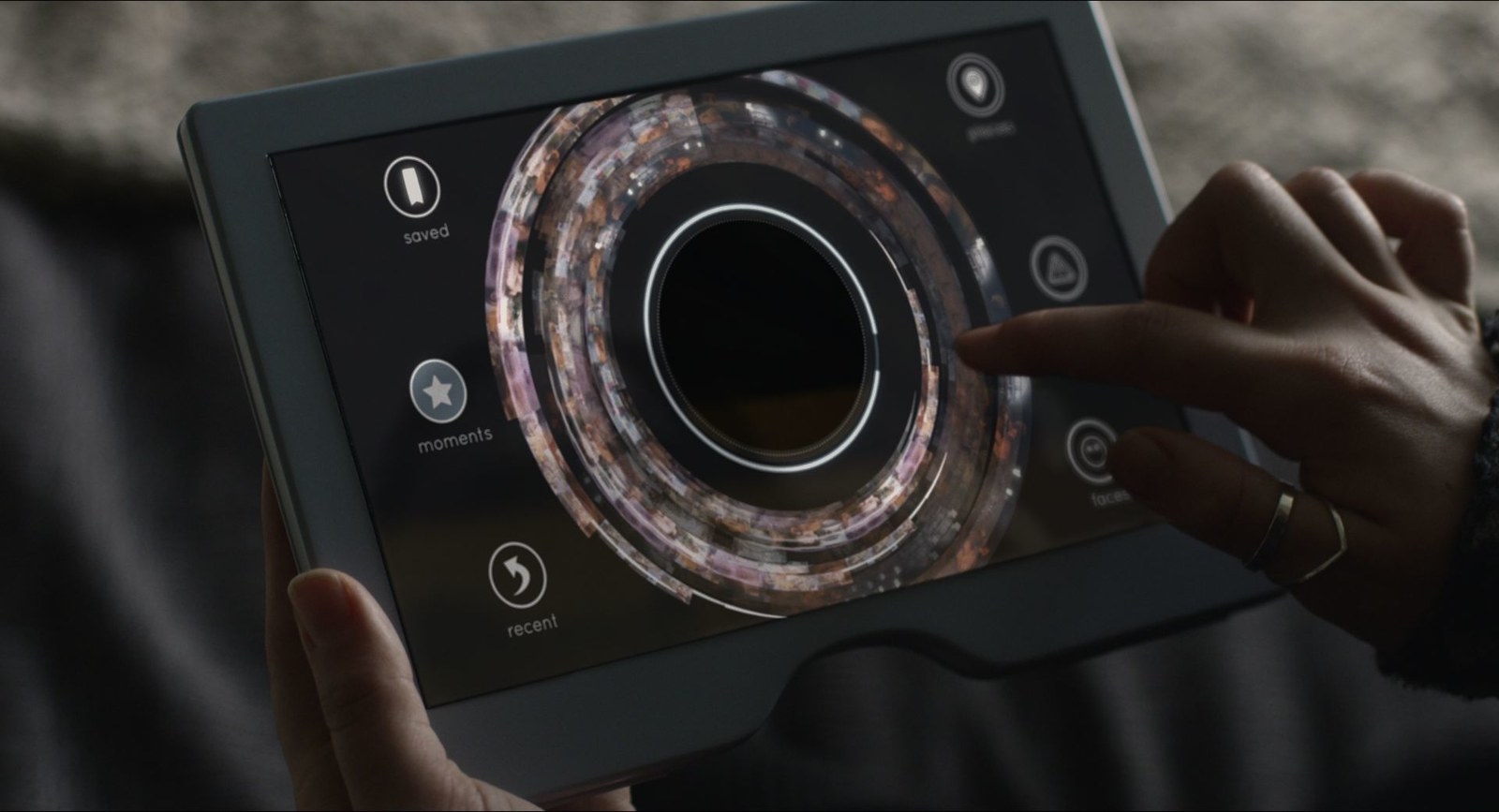
"There's nothing evil about technology; it's a reflection of our own psyches," Foster said.
And there are some positive aspects to Arkangel: They play a fun game of hide-and-seek, and Marie is able to watch Sara on the screen when she's playing in the backyard without her usual anxiety. It's also helpful in emergencies: When Marie's father (Nicholas Campbell), with whom they live, has a heart attack, Sara sees it (fuzzily, of course). But Arkangel sends an alert that Sara is watching something alarming, so Marie is able to get him help.
As Foster sees it, Marie thinks: "What if we could be bonded in that way that's more than mother and child? I will see what she sees. That's fantastic!"
But by the time Sara (now played by Sarah Abbott) is 9, kids in school — particularly an instigating boy named Trick (Nicky Torchia) — call her "chiphead," and think she's a "walking snitch," with a mother who spies all the time. Suddenly, Sara has had enough of Arkangel's restrictions. As she draws a picture at home with blood in it, the blood on the page blurs. She then pokes her finger with a pencil, also drawing blood — which blurs as well. By the time Marie gets an alert from the next room that her child has had a cortisol spike, Sara is stabbing herself violently in her hand — and then slaps Marie for trying to stop her.
"She's trying to express herself," Foster said. "The information that you keep from children is really what does them harm."
A psychiatrist (Matt Baram) determines through an evaluation that Sara has no idea what conflict is. He tells Marie that the Arkangel technology was never approved. "You can't get rid of the implant, but you can get rid of the parental unit, the screen — just throw it away," he advises.
So Marie turns off the controls; she puts the screen away. "You get this reprieve, thinking, Mom's come to her senses," Foster said. "It's difficult for her, but she understands she needs to let Sara live her life."
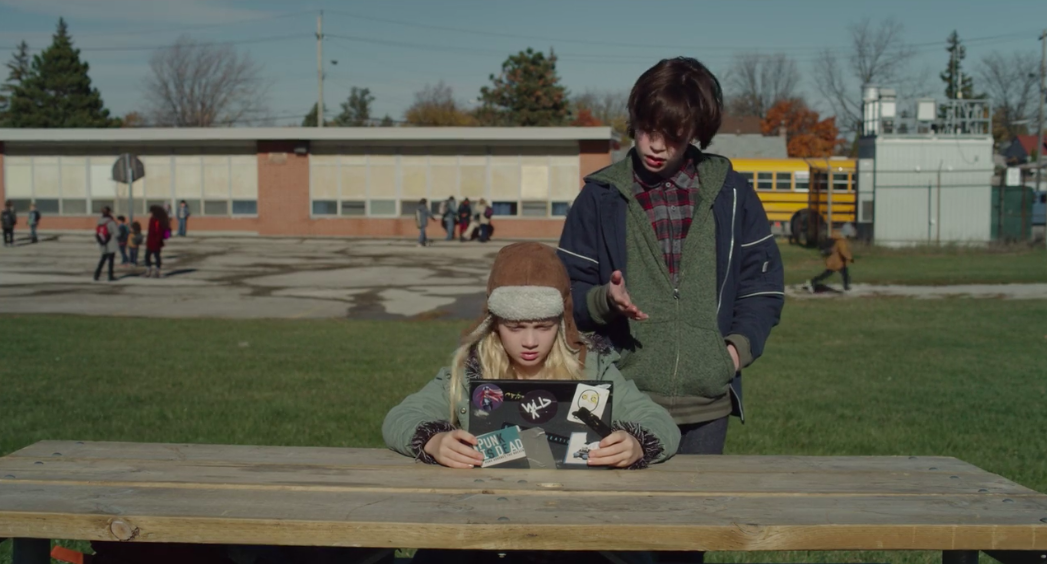
On Sara's first day without Arkangel, she's terrified. The dog barks at her, and she runs into the street. When she gets to school, she tells Trick her mother turned off the chip. In quick succession, he shows her porn ("They can't make babies that way, they have to do it different for that."); the movie Saw ("He's going to cut his own foot off!"); and a beheading video ("So the terrorist guy? Keep an eye on the knife. He's going to take his whole head off!").
The scene is shot with Sara clutching a tablet watching the videos, with Trick standing behind her like an enthusiastic tutor. Sara's face grows more and more alarmed as the videos go on — but she's also actually fine. Sara has to walk a line between curiosity and fear; Trick must do the same between charming excitement and psychosis.
"I always say my great genius of directing children — because I've directed a lot of children — is that I pick the right ones," Foster said. "There's only so much you can do. And having been a child actor, I know the ways that I liked to be directed and the ways I hated to be directed as a child. So I really just pick the right kids. That's always the longest part of the process, casting the children."
4. After Marie turns off the screen, Sara becomes a happy, well-adjusted high-schooler — but obviously, that can't last, because this is Black Mirror.
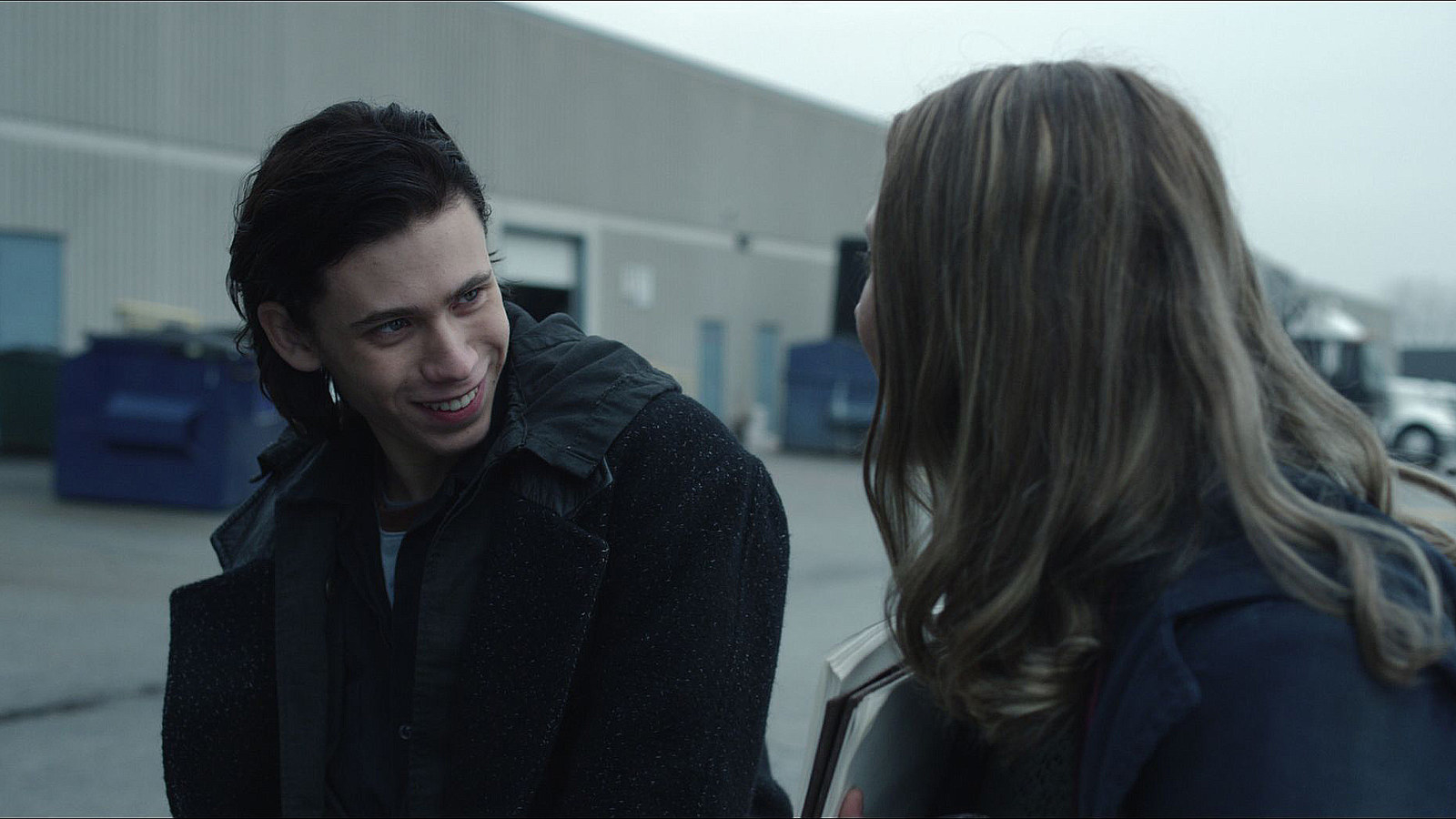
"She becomes this cool kid," Foster said of Sara. "She is confident, and does believe in herself and isn't afraid of sexuality — she's appropriately unafraid."
When we see Sara as a teenager, she and Marie "have a lovely relationship," Foster said. "In some ways, if that had been the end of the Arkangel technology, it really would have done its trick. You had all the positives of the years of keeping her safe, and then when it was time for Sara to expand into the world, she had to do it little by little and she did it on her own."
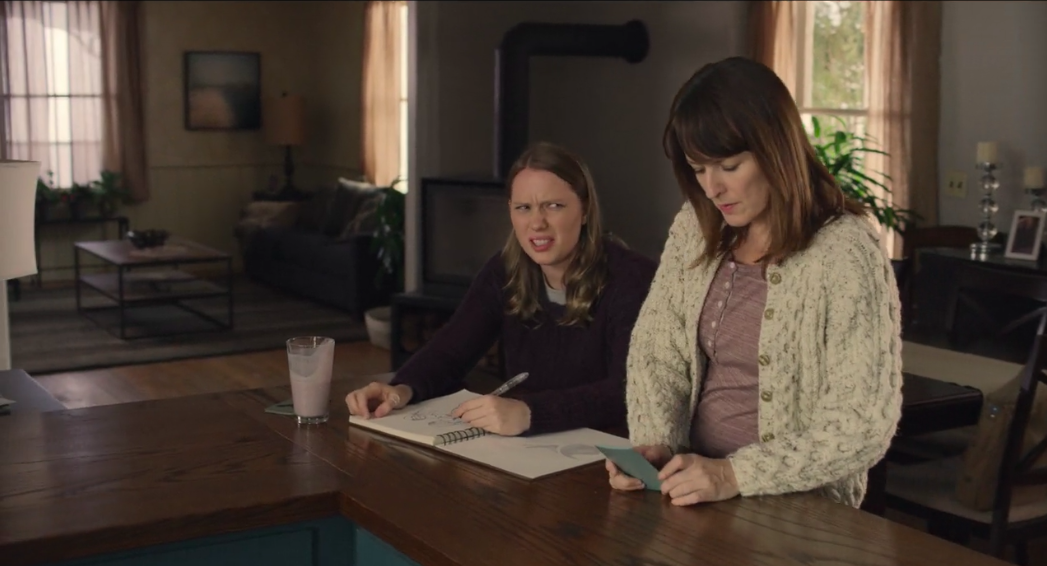
But the idyll is temporary. At school, Sara runs into Trick (Owen Teague), who has become a drug dealer (despite that, he is endearing). He invites her to a beach party, and, being a teenager, she lies to her mother about where she's going. Once Marie realizes that Sara isn't where she is supposed to be, she freaks out, and quickly finds the Arkangel screen in the attic.
Using the tracker, Marie sees that Sara is at the beach, which, in the hands of a more secure mother might assure her. But not Marie. She turns on the camera, and sees Trick from Sara's point of view: He's on top of her, and they're having sex in the back of his van. It's something no parent should ever see, Foster said: "You should not be in that place. And it changes her."
"I wouldn't say we had a disagreement about it, but I think that was the one thing that surprised Charlie and Annabel — that Rosemarie's character takes a turn. And it's a dark turn," Foster said. "I think Annabel and Charlie were like, Wait a minute — but she's the woman we love, she's so nice, she's so great, she's Rosemarie DeWitt. How can she turn so dark?"
But Foster, who was raised by a single mother, adamantly wanted Marie's darkness to surface. "I feel like I took that from my own life," she said. "I feel like that's interesting about all of our moms. Our moms were capable of such love, and capable of such cruelty."
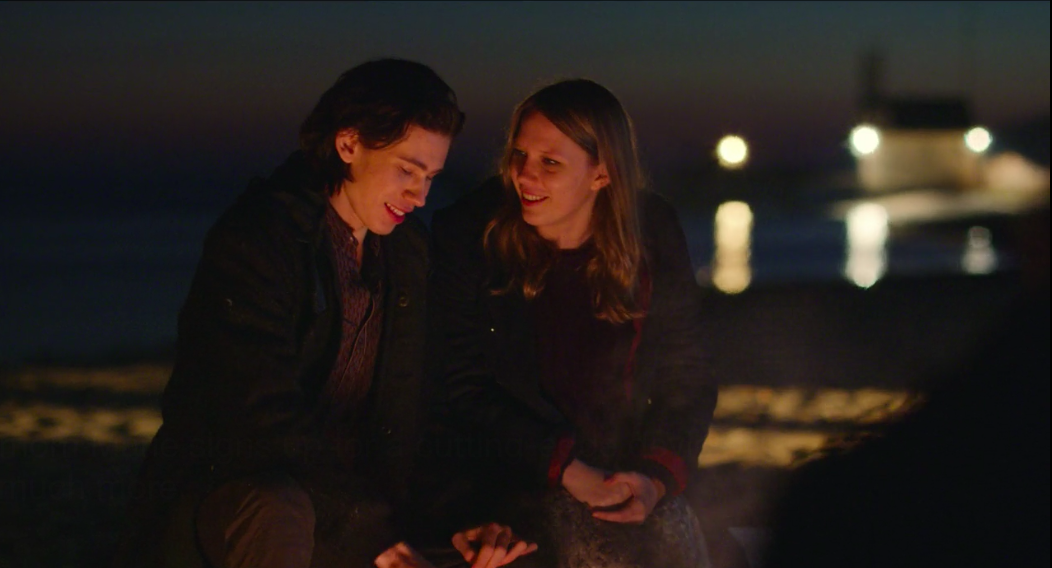
Were it not for Arkangel, Sara and Trick could have had a sweet first love. "I think that their relationship — that young, indie movie love story, with the shaky camera and the music, all that stuff of what it means to fall in love at 16 — feels so healthy to me," Foster said. But the next time Marie snoops, she sees Sara (at her insistence) snorting some of the cocaine Trick deals (but doesn't do himself), and that makes Marie — who is literally not seeing the whole picture — single-minded in her determination to break them up.
"And that's the sad part," Foster said. "What her mom is recoiling from, and what she's afraid of, are her own fears. That she feels ashamed of who she was at 16 or 20. And she doesn't want her child to endure the life lessons she learned about her own insufficiencies and her own weakness."
5. Marie, Sara, and "the biggest invasion of all."
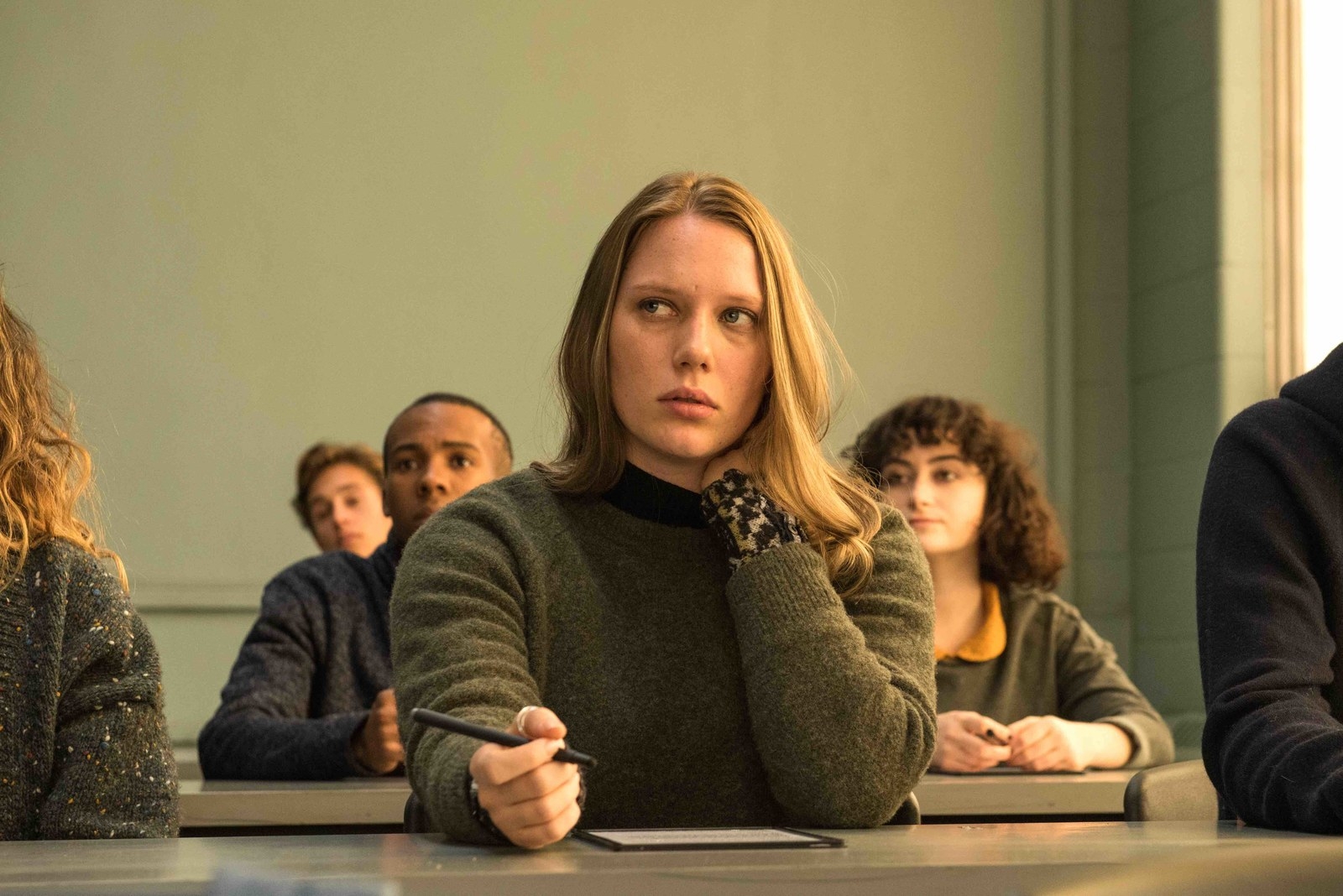
The specifics of how Sara was conceived is never revealed in the episode. But what is certain is that Marie and Sara are too close. Marie "really doesn't have a life," Foster said, outside of Sara. She certainly can't connect with anyone romantically. "That's because she's involved with somebody! She's involved with her 16-year-old, and that part of herself is not available to a partner," Foster said.
And so when Sara lies to her mother, Marie does the exact wrong thing. Instead of admitting she had used Arkangel, she lies to Sara, compounding the "rupture," as Foster called it, between them.
But what Foster called "the biggest invasion of all," occurs when the Arkangel screen alerts Marie that Sara is pregnant through its body monitoring software. Again, Marie could be honest with Sara; instead, she chooses to slip an emergency contraceptive into Sara's breakfast shake. The pill causes Sara to become violently ill, and the school nurse, testing her for the norovirus, sees what caused the vomiting. "Honey, it was the EC pill that made you sick," the nurse says. "For terminating your pregnancy."
Sara realizes what has happened, and tears home to find the evidence of her mother's betrayal — which she does easily. Using the screen, Sara rewinds, watching what her mother has seen. She's embarrassed, hurt, and furious. "The violation of that is so extreme — not because she wanted to have a child, not because she would have kept the child," Foster said. "That's all beside the point. The idea of: You're watching me. And how long have you been watching me without telling me? She doesn't know that it was just recently. It could have been the last six years."
Sara packs to leave, and when Marie comes home and picks up the screen, Sara confronts her. "You watched me," she says, her voice full of aching rage. Nothing Marie can say can excuse what she's done, and Sara grabs the screen from her mother's hands (accidentally turning on the blurring software in the process).
The two characters have a brutal physical fight, with Sara straddling Marie and beating her with the screen. Her mother's face is a bloody smudge, and she hits her again and again. The scene required a lot of emotional acting as well as physical coordination from DeWitt and Harding. "Rosemarie really is the greatest partner you can have as an actor," Foster said. "And Brenna is unbridled — she's young and unbridled and all of that. And Rosemarie, she's a mom. So she was really the right person to say, 'OK, let's just do the rehearsal of that. Let's bring the guy in who's the stunt coordinator.' Just to try to be careful!"
"That was shot in a room that was about half the size of this room," Foster continued, motioning to the standard-sized hotel room we were in. "It was a real location. There were so many complications as to how to do that. That was the hardest few days. Like, 20-hour days."
The filter turns off, and Sara sees what she's done. Not knowing whether her mother is alive or dead, she leaves. Marie then wakes up, and — beaten and bloody — runs out of the house, clutching the now broken screen, trying to get it to work again. She screams Sara's name, alone in the middle of the street. Sara, meanwhile, is calm and steadfast. She begins to hitchhike, and gets into a truck, seemingly unafraid.
To Foster, the imagery of those two things — Marie, alone and screaming, and Sara escaping out of town — is "the end of the parable."
"And this is what happens when... " Foster said. "The nightmare that was portended and anticipated at the beginning when she's in the park saying, 'Where are you, where are you, where are you?' Marie created her own abandonment. She foreshadowed it and created it."
"Which is a part of my relationship with my mom," Foster said. With a laugh, she added, "Yes, if you hold on to my shoes and you will not let go, I will kick you in the face!"
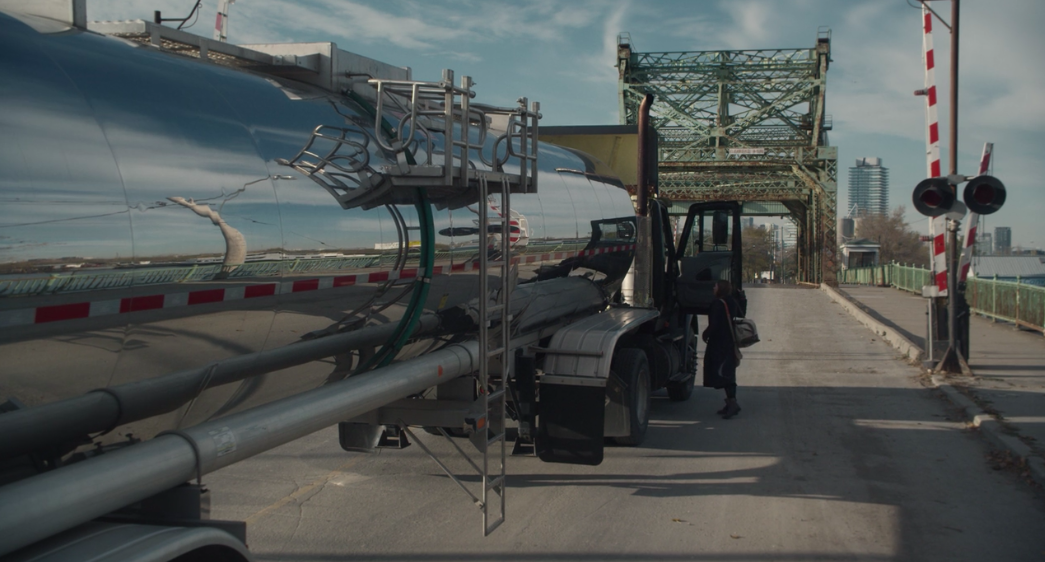
When Sara slams the truck door, the screen turns black. "Now Sara truly is unsafe in some ways. And there's a freedom to that, I think," Foster said. "Charlie and Annabel and I were always talking about that: Are we cheering for her to get into that truck? Really? We shouldn't be cheering!"
"Well, I'm cheering," Foster said with resolve. "I want Sara to get into that truck and close that door. I want her to close that door on this chapter, this town, on that relationship, and become who she is.
"So maybe she can come back."
